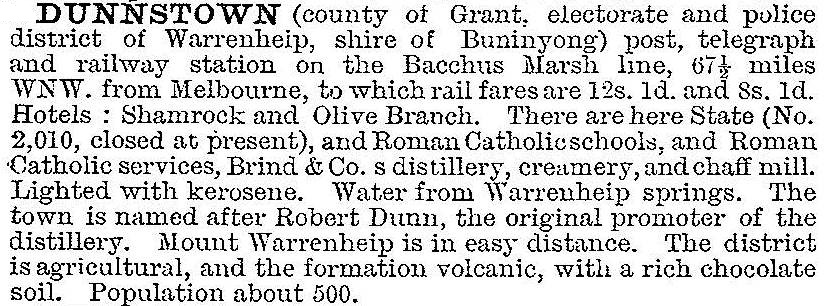Dunnstown
Dunnstown is a rural village 12 km east of Ballarat on the railway line from Melbourne. Mount Warrenheip is 1.5 km to its north. It was named after Robert Dunn who established a distillery there in about 1864, two years after the railway was opened.
Dunnstown is situated in a district extending from Warrenheip to Gordon which was intensively settled by Irish immigrants. A Catholic school was opened in 1862 in a tin shed. The government school (1878) struggled to stay open, and closed in 1900 because of the community’s strong support of the Catholic school. In 1903 the Australian handbook described Dunnstown:

The volcanic soil at Dunnstown was good for agriculture, and Irish-Australian potato farmers and dairy farmers made a living out of their holdings, usually of 20 acres. The distillery was purchased by United Distillers (Corio), and closed in about 1920. Its adjoining buildings are the site of a bottled water factory. The dairying supported a cheese factory, apparently until the 1960s as reported in the Victorian municipal directory. Our Lady of Fatima primary school (1952) continues for the Dunnstown and Warrenheip communities. The distillery buildings are on the Victorian Heritage Register.
Dunnstown has a community centre, the Shamrock Hotel, a Catholic church and school, and a recreation reserve. Its football club (1894) plays in the Central Highlands football league. Dunnstown's census populations have been:
| Census date | Population |
|---|---|
| 1891 | 74 |
| 1911 | 388 |
| 1954 | 235 |
| 1966 | 173 |
| 2006* | 254 |
| 2011 | 262 |
* and environs
Further Reading
Di Cahir, Forever scholars: a history of 140 years of Catholic education 1862-2002 and the 50th anniversary of Our Lady of Fatima Dunnstown 1952-2002, the school, 2002
Di Cahir and Helen Spratling (eds), Dunnstown Football Club: centenary 1894-1994, the club, 1994
Peter M. Griffiths, Three times blest: a history of Buninyong and district 1837-1901, Buninyong, 1988
History of Dunnstown website


